- Home
- Laura Martin
Glitch
Glitch Read online
Dedication
To all the heroes throughout history who have struggled to
make their tomorrow better than their today. And for
the kids who read this who will do the same.
Contents
Cover
Title Page
Dedication
Chapter One: Regan
Chapter Two: Regan
Chapter Three: Elliot
Chapter Four: Regan
Chapter Five: Elliot
Chapter Six: Regan
Chapter Seven: Elliot
Chapter Eight: Regan
Chapter Nine: Elliot
Chapter Ten: Regan
Chapter Eleven: Elliot
Chapter Twelve: Regan
Chapter Thirteen: Elliot
Chapter Fourteen: Regan
Chapter Fifteen: Elliot
Chapter Sixteen: Regan
Chapter Seventeen: Elliot
Chapter Eighteen: Regan
Chapter Nineteen: Elliot
Chapter Twenty: Regan
Chapter Twenty-One: Elliot
Chapter Twenty-Two: Regan
Chapter Twenty-Three: Elliot
Chapter Twenty-Four: Regan
Chapter Twenty-Five: Elliot
Chapter Twenty-Six: Regan
Chapter Twenty-Seven: Elliot
Chapter Twenty-Eight: Regan
Chapter Twenty-Nine: Elliot
Chapter Thirty: Regan
Chapter Thirty-One: Elliot
Chapter Thirty-Two: Regan
Chapter Thirty-Three: Elliot
Chapter Thirty-Four: Regan
Chapter Thirty-Five: Elliot
Chapter Thirty-Six: Regan
Author’s Note
Glitch Glossary
Acknowledgments
About the Author
Books by Laura Martin
Copyright
About the Publisher
Chapter One
Regan
April 14, 1865. Gosh, I was sick of that date, and it wasn’t just because that is when our sixteenth president was assassinated. Nope. I was sick of April 14, 1865, because I kept getting sent back to it for training purposes. Although training purposes was just code for, You screwed up again, Regan; get it right this time.
I materialized in the back row of Ford’s Theatre for the fifth time this year just as the play, Our American Cousin, began. I always materialized into seat 10B when I did this particular practice simulation. It was supposed to contain Mrs. Margaret O’Hana, but she’d gotten sick with the measles and hadn’t been able to make it to the performance that night. Her change of plans had left a convenient place for time travelers, or Glitchers, as we’re called now, to slip in and out of history on the infamous night Abraham Lincoln was shot by John Wilkes Booth.
I’d see Booth momentarily, but I wasn’t here to fix him. He would be allowed to murder our president without any interference from a Glitcher like myself. Interfering with him is against the law. Interfering with him was why I was here on a training mission in the first place.
I opened my eyes and looked around. Because I’d been here countless times before, I barely noticed the immaculate and stately Ford’s Theatre, the theatergoers around me wearing their best dresses and suits, or the smell of a generation who handled body odors by covering them up with heavy colognes and perfumes. Even though I’d done this a lot, I still couldn’t stop my eyes from automatically going up to the balcony where Mr. and Mrs. Abraham Lincoln would be taking their seats any minute. They would arrive late to the theater tonight and would be safe until the intermission, when their bodyguard would decide he’d rather go sit at a saloon and have a drink instead of protecting the president. There wasn’t such a thing as the Secret Service yet. Although, in a weird ironic twist, Abraham Lincoln would sign the document that would create the Secret Service right before he left for the theater tonight. With some reluctance, I tore my eyes away from the balcony. I had less than ten minutes to find the Butterfly and complete the mission. It was time to get to work.
The last time I’d done this training mission, I’d immediately stood up and made my way to the lobby of the theater, sure that the Butterfly would be in wait there to waylay Booth. Unfortunately, I’d thought wrong.
I hated this simulation. It felt ten kinds of wrong to allow something horrendous like an assassination of arguably one of our greatest presidents, but it was all part of the job. It was why this particular simulation was so important to our training. We had to learn that what we thought about right and wrong didn’t matter. At least not when it came to changing history. As a Glitcher, it was my job to make sure things stayed exactly the way the history books described without interference from a Butterfly.
The term Butterfly had thrown me for a loop when I’d first heard it. It seemed too, I don’t know, fluffy to describe a time-traveling criminal the same way you describe a really pretty bug. I mean, a time-traveling criminal is usually someone attempting to manipulate history with the full intention of screwing up the future, and there was nothing fluffy about that. But I learned quickly that the term Butterfly did not come from the beautiful insects I saw landing on the flowers outside my window. Instead, it referred to the butterfly effect.
In 1963, this guy named Edward Lorenz presented a theory to the New York Academy of Sciences that “a butterfly could flap its wings and set molecules of air in motion, which would move other molecules of air, in turn moving more molecules of air—eventually capable of starting a hurricane on the other side of the planet.” And everyone thought he was crazy for thinking something as small as a butterfly could start a snowball effect capable of wiping out whole cities.
He was laughed at.
He was called a fool.
And then thirty years later, they realized he was right.
So we called time-traveling criminals Butterflies, despite the fluffiness of the word, because they traveled back to the past to change something. They were the people who believed Hitler should have won World War II, that slavery should never have been abolished, or that women shouldn’t have been given the right to vote. That’s where Glitchers come in.
I glanced down at my watch. It was the exact same one the woman three rows up and two over was wearing. Everything from my light blue dress with the ten crinolines underneath to the way my hair was curled and pinned up to the back of my head like a poodle was historically accurate, down to the last piece of lace trim. Of course, I wasn’t exactly historically accurate, since unchaperoned twelve-year-olds weren’t a common sight at Ford’s Theatre, but that didn’t matter for a simulation. If I ever actually did this Glitch for real, I’d be an adult with years of time traveling under my belt. I swallowed hard and ignored the fact that the thought made my stomach feel like I’d swallowed a bucket of live snakes.
Shaking my head, I forced myself to focus. I looked just like anyone else at the theater. The problem was that the Butterfly, wherever he or she was, did too. There was movement in the balcony to my right, and I glanced up to see the president and his wife taking their seats with their friends Clara Harris and Major Henry Rathbone. Those friends were one of the reasons they were late; they couldn’t get anyone else to come with them tonight. Had Ulysses S. Grant’s wife not been mad at Mrs. Lincoln, he would have been here instead of Rathbone, and Lincoln’s wouldn’t have been the only assassination.
A movement to my right caught my eye; a slim man, probably thirty or so, had just stood up from his seat. I watched him leave, looking for a clue that would let me know he was the Butterfly. Because if he wasn’t, and I took him down, then I would cause even more damage to the future. It was one of the biggest rules of Glitching: you could not, under any circumstances, accidentally become a Butterfly. You had to be in the past, but n
ot interfere or interact with it in even the tiniest, most inconsequential way. I had to make sure I touched no one, talked to no one, and didn’t change the course of anyone’s future by my actions. I was here to take down the Butterfly. That was all.
The man in question paused to talk to someone sitting in the aisle, and I immediately dismissed him. Butterflies never knew anyone from the time period they were messing with. Then I saw her. Two rows up on my right, a woman got up and made her way quickly down the aisle toward the exit. She was the Butterfly. Don’t ask me how, but I knew it instantly at a bone-deep level, but because I’d have to give a concrete reason for the identification in my debriefing, I took the extra half second to identify where she’d gone wrong. Like me, she wore an elaborate dress trimmed with lace and her hair was twisted back into a knot at the base of her neck. I bit my lip; nothing was out of place there. Then I saw it. In her ears were three tiny holes where earrings were supposed to be. No one in 1865 had multiple piercings. She was it.
I carefully got up and made my way down the aisle, never taking my eyes off her as she slipped out the exit doors. I had two options. Option One—I could follow her into the lobby and take the chance of her making a scene. Option Two—I could intercept her somewhere out of the way before she made her move to take down Booth. Option One was easier, but I really didn’t want to have to redo this simulation for the sixth time, so Option Two it was.
I slipped out the side door and into one of the theater’s many hallways. It felt narrow and dark with its thick velvet draperies and busy wallpaper. Suddenly there was a noise to my left, and I saw a flash of blue skirts. Turning, I walked quickly in that direction. I’d have liked to run, but running wasn’t something a lady did in a gigantic dress and ridiculous shoes that pinched. I had to blend in on the off chance that someone noticed me. Rounding the corner, I hurried up the narrow stairs toward the second floor. My lungs fought to expand inside the stupidly tight dress as I looked left and right down the empty hallway. To my left I could see the curtain that hid the president from view. According to my watch, I was minutes away from John Wilkes Booth coming up the same staircase I’d just used, gun in hand. I felt my first flutter of panic in my chest. Where had she gone? Should I go back down to the theater and risk missing her or stay where I was and hope I saw Booth before she did?
As I stood there, frozen, trying to decide which was the right answer, I heard a small sound directly behind me. It was the sound of someone unwrapping something covered in plastic. Plastic, a material that wouldn’t be widely used until the 1960s. I whirled and saw the curtain behind me quiver just as the sound of booted feet on the stairs came from below. John Wilkes Booth was on his way up. Without stopping to think, I threw myself behind the curtain and wrapped my arm around the startled woman’s neck. She let out a muffled gargle, and I saw the long lethal-looking syringe in her hand. She stumbled sideways, throwing us out into the open, and I fought to keep my balance without losing my grip.
Her eyes went wide as she realized that her opportunity to change history was about to be taken away. Her fingernails and teeth dug into the arm I had wrapped around her neck, but it didn’t matter; I had her. The thump of Booth’s boots was getting louder, and I knew I had mere seconds to get this done. If he came up the stairs and saw a woman and a twelve-year-old girl brawling like a couple of ultimate fighters in big frilly dresses, it might be enough to deter him from his plan and forever change history. I reached for my belt with the arm that wasn’t getting gnawed on and grabbed my Chaos Cuffs. It took a second or two of fumbling, but I got them on her wrists just as the handsome face of John Wilkes Booth made it up the stairs. A heartbeat later and we’d disappeared, leaving him free to commit one of the most heart-wrenching crimes in history.
Chapter Two
Regan
My eyes snapped open inside the narrow white simulation room, and I immediately became aware of how bone-numbingly cold I was. Large computer monitors lined the walls around me, and I could see the frozen image of the woman and me mid-struggle with Booth’s surprised face staring right at us. I almost groaned out loud in exasperation, but I swallowed it at the last second. The commander’s daughter wasn’t allowed to whine like that.
“So I failed?” I asked. “Again?”
“That’s right, cadet,” said Professor Brown with a sympathetic smile as she leaned down to remove the probes on my arms and legs so I could sit up.
“By how much?” I asked, glaring at the screen.
She consulted the slim black tablet she held for a moment and then sighed. “One second.”
“Tell me you’re kidding,” I said.
“I’m afraid not,” she said. “In that second, Booth saw you disappear in front of his eyes, and it was enough for him to call off the plan. As you may recall, he’d already gotten cold feet once in his attempted kidnapping of Lincoln, so it didn’t take much to spook him that night.”
“Well, that stinks,” I said.
“One way of putting it,” said Professor Treebaun as he looked up from his tablet for the first time. “Although it seems a bit tame considering that if this was a real mission, you’d have just irrevocably ruined the unity of the United States of America.”
“I know, I know,” I said, really not wanting to hear yet another lecture about all the awful things that happened in the future if Lincoln survived his night at Ford’s Theatre. Knowing that something that seemed so 100 percent right, like saving the president of the United States, could actually have catastrophic consequences didn’t make it feel any less awful. I’d heard all that before, the last time I’d failed this simulation. But at least last time I hadn’t failed by one measly second.
“So, I’m off to the recap review room?” I asked, silently praying she’d let me off the hook. I mean, how many times could you watch the same recap?
“Correct,” said Professor Treebaun, and I stifled a sigh. Five. You could apparently watch a recap for the same simulation five times.
Professor Treebaun scowled at me, as though he’d read my mind. “You will watch your recap, and you will continue watching recaps until you learn the importance of a second. We will get this simulation on your schedule for next week.”
“Does my mom already know?” I asked, trying and failing to keep the slight pleading tone from my voice.
Professor Brown nodded. “She watched your simulation live from her office.”
“Peachy,” I said, shutting my eyes for a second so I could block out the screenshot of my failure for a moment. Professor Brown finished pulling the electrical sensors off my arms and legs, and I barely flinched as the sticky pads yanked out my arm and leg hair.
“What was that, Cadet Fitz?” asked Professor Treebaun sharply, and I snapped my eyes open.
“Nothing, sir,” I said.
“That’s what I thought,” he said as he unplugged his tablet from the main computer and tucked it in his bag. “You know,” he went on, eyebrow raised, “it would behoove you to study your history a bit more. There was a different access point to that particular stairwell that would have saved you that precious second. I thought you’d have memorized that by now.”
“You and me both,” I muttered.
“Enjoy your recap,” he said over his shoulder as he left the room, the doors sliding shut behind him with an official-sounding metallic click.
I watched him walk out and frowned. He was right. I should know my history better by now. I’d been drilled on this particular event over and over again. I’d read countless reports on the Lincoln assassination. My mom had even made flash cards for me detailing things like the name of Booth’s coconspirators, the ins and outs of the theater, the events leading up to the history-altering murder. Flash cards, for crying out loud. And all of it should be firmly planted in my head. But it wasn’t. Sometimes I felt like my brain was one of those colanders our housekeeper, Mrs. Ellsworth, used to drain pasta, full of little holes that let all sorts of important things escape without my permiss
ion.
Now that Professor Treebaun had mentioned it, I did vaguely recall my mom mentioning the multiple access points to the staircase Booth used. But it hadn’t stuck, and because of that I’d failed the simulation again, and the daughter of the first-ever female commander in chief of the Glitch Academy wasn’t supposed to fail. For probably the millionth time in my life, I wondered why everyone else got watertight brains, while mine was apparently Swiss cheese.
“Don’t be too hard on yourself,” said Professor Brown, her demeanor markedly more relaxed now that Treebaun was gone. “We don’t just strive for perfection at the Academy. We demand it. And perfection is hard sometimes. You’ll get it eventually.” She unplugged her own tablet and put it in her bag before looking back up at me. “Please wait for your recap to upload, and then join your classmates in the recap review room in five.”
“Yes, ma’am,” I said, staring down at my slightly blue-tinged fingers, which were more than a little numb from the freezing temperature of the simulation room. Something soft fell into my lap—my uniform jacket—and I looked up at Professor Brown and smiled my thanks as I shrugged it on over goose-bump-riddled shoulders. Like all the cadet jackets, it was a soft green, closely fitted so it rested across my shoulders like a second supple skin, and I felt instantly warmer. The thin white tank I’d been wearing to allow the sensors contact with my skin was scant protection from the icy wafts of air being pumped into the room. There was something to that. The cold air. It allowed simulations to function better somehow. I racked my brain to remember why that was, failed to come up with anything, and gave up. Which, I realized with a grimace, could very easily be my motto. Professor Brown turned and headed toward the doors, but she stopped and turned back at the last moment.
“And Regan?” she said, and I jumped at hearing my first name. No one used first names at the Academy. I’d grown up at the Academy, running the halls since I was in diapers, and even then I’d been Cadet Fitz. Always Cadet Fitz.
“Yes?” I said.

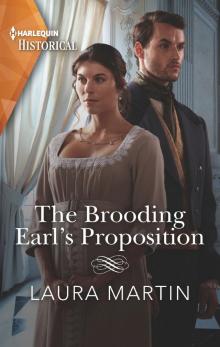 The Brooding Earl's Proposition
The Brooding Earl's Proposition Reunited with His Long-Lost Cinderella
Reunited with His Long-Lost Cinderella Courting the Forbidden Debutante
Courting the Forbidden Debutante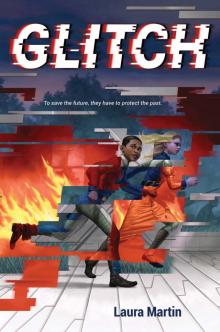 Glitch
Glitch Flirting with His Forbidden Lady--A Regency Family is Reunited
Flirting with His Forbidden Lady--A Regency Family is Reunited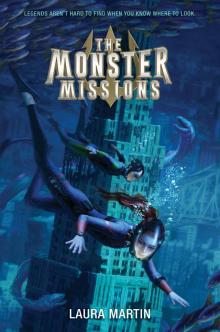 The Monster Missions
The Monster Missions Falling for His Practical Wife
Falling for His Practical Wife Her Rags-to-Riches Christmas
Her Rags-to-Riches Christmas Secrets Behind Locked Doors
Secrets Behind Locked Doors Under a Desert Moon
Under a Desert Moon Her Best Friend, the Duke
Her Best Friend, the Duke An Earl to Save Her Reputation
An Earl to Save Her Reputation Heiress on the Run
Heiress on the Run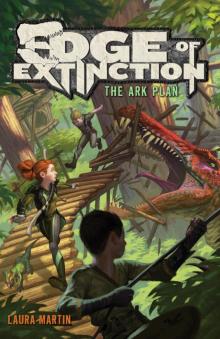 The Ark Plan
The Ark Plan A Ring for the Pregnant Debutante
A Ring for the Pregnant Debutante Code Name Flood
Code Name Flood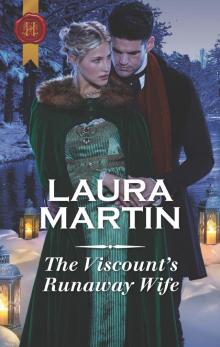 The Viscount's Runaway Wife
The Viscount's Runaway Wife An Unlikely Debutante
An Unlikely Debutante